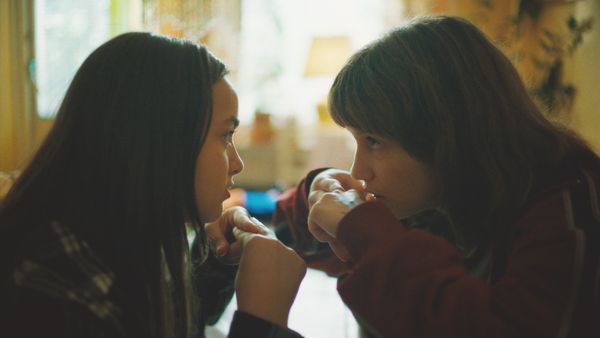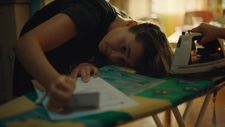 |
| Dilvin Asaad and Bianca Delbravo in Paradise Is Burning |
Mika Gustafson's narrative feature debut, Paradise Is Burning, co-written by Alexander Öhrstrand, revolves around three sisters, 16-year-old Laura (Bianca Delbravo), 12-year-old Mira (Dilvin Asaad) and seven-year-old Steffi (Safira Mossberg), who are left to fend for themselves by their absent mother. With summer fast approaching and left unsupervised, the three sisters enjoy their freedom, living a wild and carefree existence. However, when social services schedule a meeting, Laura must find someone to impersonate their mother, while keeping the threat of social services a secret from Mira and Steffi.
Gustafson's previous works include the 2017 feature documentary, Silvana - Väck Mig När Ni Vaknat, about the Swedish artist and feminist, Silvana Imam, which she co-directed with Olivia Kastebring and Christina Tsiobanelis. Her shorts include Secretly Filmed My Boyfriend After We Had a Fight (Smygfilmar Min Pojkvän Efter Att Vi Bråkat, 2013), which confronted the camera's invasive gaze, and Mephobia (2017) about children and adolescents expressing their frustrations, which featured Öhrstrand who has also starred in the television crime dramas Wallander and The Bridge.
 |
| Safira Mossberg in Paradise Is Burning |
In conversation with Eye For Film, Gustafson and Öhrstrand discussed the influence of rule-breaking cinema on their working-class drama, the emphasis on emotional truth and how the success of the film has shrunk their world.
Paul Risker: What were the seeds of the idea for this, your narrative feature début?
Mika Gustafson: Trying to make a long answer short, there were a lot of things. One was I wanted to make something that has not only complex female characters but human beings. Alex and I were talking about life and film, and what we wanted to do and then this story about these three sisters and the bond between them started to develop.
Alexander Öhrstrand: When Mika was at film school, she had the opportunity to enter a pitch competition. She didn't have an idea for a feature film, but she had talked about this idea of two sisters, and I said we would make something up. So, I wrote something, and Mika would say, "This is good," or "This is bad." She rewrote it, and we went back and forth for a few hours. We came up with something and sent it in, and it was accepted - we actually won the pitch competition.
MG: Alex was an actor at that point and I said it would be nice to write it together. He had to apply to screenwriting school, and he got in, and I said, "Now you're stuck with me." We're both interested in the French New Wave and when we were writing together it was a little bit like the relationship between a director and an actor.
AO: We wanted something new, and we didn't want to just tell a story but look at how the film treats the rituals. Do we need to break the rules? Do we need to look into the camera?
MG: We wanted to tell a story about these kids, but we also wanted the children to be human beings and to have this great inner life. The film is about the transience of time, and we mix that with humour. You see, the answer is getting long.
 |
| Bianca Delbravo and Ida Engvoll in Paradise Is Burning |
PR: So, you tried to borrow from the spirit of The French New Wave?
AO: The French New Wave was about breaking rules and, for instance, in a Godard film, the normal way would be to have a car pull up to the curb and the character gets out, walks over to the café, sits down and orders a coffee. Instead, with Godard and the French New Wave, you see the car stopping at the curb and cut to the character drinking coffee in the middle of a conversation. It's an emotional approach and so Mika and I were talking about what's fun and fresh for us.
PR; When you watch films by these directors there's an interesting balance of immersing the audience in the experience opposite triggering their critical minds.
AO; You never want the audience to start thinking about technical stuff, but it's okay to play with an audience and ask, 'Hey, do you know you're watching a movie?' At the same time, you want the audience to feel immersed, like they're living alongside the character. The more significance a scene or moment has, the more important it is for the audience to feel immersed, and to not think too much about the fact they're watching a film.
MG: Alex and I also talk a lot about the magic in life, or its absurdity. That and the question of why we're writing interests me. We are always talking about life because that's what we mirror in cinema, and it can be so absurd with its signs and coincidences.
When we talk about one another's scenes or ideas, we always ask what is the truth? We don't talk about what is good and bad. We ask if it's interesting or true. When we talk about what's true, it's not about how things are or were, it's more, how we feel about things, and how are people connected by their emotions? It's an emotional truth.
 |
| Dilvin Asaad in Paradise Is Burning |
AO: Emotional truth is one of the reasons why you can feel the way you do. For instance, in the last scene, who rang the doorbell? Was it child services and this is the last time the sisters are going to have together before being placed in different foster homes? Or was it Hanna, saving them, pretending to be the mum and this was a way of celebrating?
The emotional truth of the scene is that sometimes, in life, bonds are created that cannot be broken, not even by something so horrific and terrible as becoming an adult. I think this is the emotional truth of that scene. The bond between the sisters is not that they learn to be better human beings, they are no better or worse than when the film started. Instead, Laura has gained the ability to feel vulnerable with her younger sister, and she has gained the notion that her sister is not a thing, but is a human being that can comfort her. The viewer can ask whether the sisters can really get away with it or not, and at the same time, they can feel this emotional truth.
PR: Cinema is about creating a sense of feeling, which you describe as an emotional truth, but I think about the British 'kitchen sink' dramas, and how I find the honesty drearily confronting.
AO: I totally agree, but I would also ask why people laugh at funerals? People that are in dire situations don't always walk around depressed. On the contrary, they do whatever they can to feel better. So, I agree kitchen sink films can feel depressing, like you’re being pushed away, but I think, 'Don't those characters ever laugh?'
MG: We also discussed dignity, and you shouldn't look down on or feel bad for the sisters.
AO: Yes, you shouldn't pity the sisters because they're masters of survival, and that's true for most characters in the film, like Sasha the karaoke guy. The only dignity he has is the hope of winning a karaoke competition, but for him, that's his dignity.
 |
| Paradise Is Burning |
PR: Paradise Is Burning stresses the need to acknowledge resilience and toughness in a more modern context that embraces vulnerability and sensitivity. What's nice is that it's through the prism of adolescent instead of adult characters.
AO: Some people say this is a teen movie when they hear it's about three teenagers. I say, "No, it's about adults." Just because the main characters are kids doesn't mean grown-ups can't relate to them, and just because they're kids doesn't mean they don't have existential questions about life.
MG: As we were creating these three characters, we would sometimes change the gender to see whether we let them move differently in society or gave them different kinds of scenes. So, we changed back and forth, and also, with the other characters, we tried different ages and genders.
PR: On the subject of change, is making a film a transformative experience?
AO: I don't think there's much that changes the core of your being. I recently became a father and, of course, I've changed as a human being, but at the same time, I'm the same person in other respects. The film changed me in the way that I'm capable of [functioning with] much less sleep than I thought I was able to, and I'm capable of ingesting too much nicotine, to the point I needed to stop.
I changed because I became a biological father, and I became a surrogate father to these three actors. I hadn't expected that. Even today, I will have dinner with their families, and I'm helping Bianca get into acting school.
MG: It's very important if you work with first-time actors and kids to follow them the whole way, until they grow up, because you are somewhat responsible for them.
The film didn't change me. Instead, it felt like I had come closer to something I longed for. It was almost like a release to reach the point of telling this story.
 |
| Safira Mossberg in Paradise Is Burning |
Alex and I are a couple in real life, and we're also a creative couple, so we see each other all day long. We always work together, and I love that way of living. It's difficult because we push each other very hard, but it's also sometimes fun.
AO: One thing that changed for me is that, after the film's success, you get a sense of how small the world really can be. You're standing in the elevator at the Excelsior Hotel, at the awards ceremony and someone says nice shoes. I turned around, and I said, "Thank you so much Maggie Gyllenhaal."
How small the world can be - one moment we're in Stockholm beating up a couch with two seven-year-olds, and the next moment you're in the elevator with Maggie Gyllenhaal.
MG: As long as I'm curious, I'll continue to make movies. But if I get old, and I'm not curious anymore, I really hope you [Alex] tell me to stop. I still feel curious, and think about whether it's possible to do something new with our next film? Can we push something, even if it's just a scene, a camera angle or something with the performances? Can we push for and create something that's new and will be inspiring for someone? This is something you should be trying to do.
Paradise is Burning was released in UK and Irish cinemas on Friday 30 August. In the US, it opened in New York at the IFC Center on Friday 23 August and will open in LA on Friday 6 September.





















